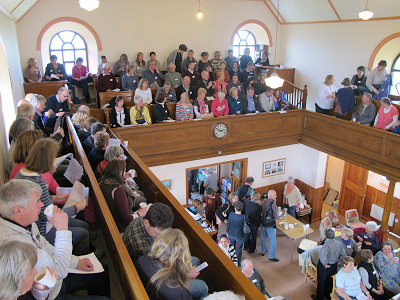A new age is beginning in space commerce. After a little history this article considers where things may go next in timescales of ten, twenty and a hundred years. This is no longer purely science fiction, it is becoming technological fact. It's possible to foresee voyages to the stars a hundred years from now.Yes, we really are at the beginning of a new era in spaceflight. Until recently almost all efforts in space were the preserve of governments or multinational bodies like the
European Space Agency (ESA).
In a few areas private companies were able to play a role, but the funding was mostly government based.
The only real exception has been for communications satellites, and even these had to be flown on rockets designed and built for governments.
In this article we'll look at how the situation has been changing, especially over the last five years.
Early history - I was nine-years-old when
Sputnik 1 was launched by the
Soviet Union in October 1957. I remember hearing its bleeping tone on the radio and noticing how anxious Mum and Dad seemed that the Russians rather than the Americans had achieved this feat of engineering.
Of course, America wasn't far behind; though early European cooperation in rocketry failed.
In April 1961 Yuri Gagarin flew on
Vostok 1 and before long orbital trips seemed almost routine. The Americans landed
Apollo 11 on the Moon in July 1969. Today we can add many more nations, an international organisation (ESA), and even a private company (
SpaceX) to the list.
Commercial satellites - Commercial space businesses began with government contracts to construct rockets and build satellites. But the first businesses to make a profit from space were broadcasting and telecommunications companies.
Since then direct broadcast TV, weather satellites, earth resources, mapping, messaging, delivery tracking and global positioning (GPS) have become mainstream commercial applications. And military satellites, although not commercial in nature, are widely deployed and used by many national governments.
The space launch industry - With so many commercial satellite operators, it was clear that there was a market for a commercial space launch industry.
Until recently those launchers have been funded and specified by governments, but now SpaceX, a number of other companies and some cooperative ventures such as the United Launch Alliance (ULA) are looking to make a profit by selling launch services. This includes provision of the launch vehicles, payload integration, fuelling, pad infrastructure, and managing the launch itself.
Virgin Galactic -
Virgin is close to providing sub-orbital short hops into space. They plan to cater for space tourism as well as offering research flights. For the first time scientists and engineers will be able to fly with their experiments regularly and return them reliably. This service may replace throw-away sounding rockets.
Other companies are working on sub-orbital flight too, but Virgin are very close. Their spacecraft (SpaceShipTwo) is about to begin powered test flights.
SpaceX - Elon Musk's company already offers two sizes of commercial launcher (
Falcon 1e and Falcon 9) and is close to testing Falcon Heavy for even larger payloads. They are also using their
Dragon cargo ship to fly regularly to the
International Space Station (ISS), are working hard on a crewed version of Dragon.
DragonLab is a free-flying commercial venture to provide a weightless platform for science and technology. Any organisation can book space on DragonLab knowing that their payload can be recovered and flown again as often as required.
A further project (
Grasshopper) is developing the technology to safely land and re-use Falcon 9 rocket stages. And in the more distant future SpaceX has ambitions to see a viable human colony established on Mars.
Bigelow -
Bigelow Aerospace has two prototype inflatable space habitat modules in orbit, is planning to attach one to the ISS for testing by NASA, and plans to offer orbital accommodation for science as well as for tourism.
Mars One -
Mars One is a non-profit foundation based in the Netherlands. They hope to colonise Mars and pay for it by a combination of donations, sponsorship and TV contracts. The plan is to send four people to Mars in 2023 with four more arriving every two years after that. These are one way trips. Mars One is now open for applicants and is signing contracts for initial design studies.
Asteroid mining - At least two companies have been created recently with a view to the commercial exploitation of asteroidal materials. Asteroids are rich in rare and precious metals as well as volatiles in the form of ices.
Where is it all leading? - This really is a special time in spaceflight. We are progressing from state funded and controlled projects at relatively small scale and high cost, towards commercial operations taking humankind and our machines further and doing so profitably.
The immediate future offers the prospect of short hops into space for anyone with £20 000 to £30 000 to spare, a reusable Falcon 9 first stage substantially reducing the cost to orbit, and commercial access to low Earth orbit (LEO) for both crewed and uncrewed spacecraft. This is likely to include small capsules like SpaceX's Dragon and much larger volumes such as the Bigelow inflatable modules. Much of this will happen in the next ten years.
In the longer term we can expect commercial operations to develop raw material supplies from Asteroids, as well as small colonies on
Mars and perhaps the
Moon too. For this we may be looking at a twenty year timescale.
But make no mistake, once this process has begun there will be no stopping it. We are probably heading for a
Solar System wide civilisation within the next century. Children born today will find it quite normal to watch and read material created on a different planet or in orbit elsewhere around our local star.
And once the outer planets have been reached it will be only a matter of time before our descendants start to consider how best to
reach other stars. Perhaps they will send out self-sufficient colonies based on and inside modified asteroids.
Questions:
- If humans colonise space, how will that affect society, faith, and the future?
- Are you going to sign up for Mars One's one way trip to Mars? (I'm not!)
- How would you feel if your children or grandchildren were living on Mars?
- If the cost comes down enough, would you fancy a sub-orbital hop into space?
See also:

















